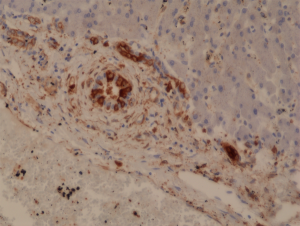anti-GST3/GST pi (human) Rabbit Monoclonal (RM347)
| Code | Size | Price |
|---|
| REV-31-1233-00-R100 | 100 ul | £455.00 |
Quantity:
Prices exclude any Taxes / VAT
Overview
Antibody Isotype: Rabbit IgG
Antibody Clonality: Recombinant Antibody
Antibody Clone: RM347
Regulatory Status: RUO
Target Species: Human
Applications:
- Immunohistochemistry (IHC)
- Western Blot (WB)
Shipping:
Blue Ice
Storage:
+4°C
Images
Documents
Further Information
Alternate Names/Synonyms:
Glutathione S-transferase P; GST pi; GSTP1-1
Concentration:
N/A
EClass:
32160000
Form (Short):
liquid
Formulation:
Liquid. 50% Glycerol/PBS with 1% BSA and 0.09% sodium azide.
Handling Advice:
Avoid freeze/thaw cycles.
Immunogen:
A peptide corresponding to the C-terminus of human GST3/GST-pi.
Long Description:
Recombinant Antibody. This antibody reacts to human GST3/GST-pi (Glutathione S-transferase P). Applications: WB, IHC. Source: Rabbit. Liquid. 50% Glycerol/PBS with 1% BSA and 0.09% sodium azide. Inhibition of free radicals and the damage they produce is critical for cell survival, particularly in neurons. Glutathione S-transferases (GSTs) are a class of inducible, multifunctional, detoxifying enzymes that catalyze the reduction of hydrophobic electrophiles, like those generated by pesticides and chemotherapeutic compounds. In mammals, six different isoforms alpha, mu, pi, theta, omega, and zeta have been identified. GST-Pi is expressed in many human tissues, particularly in the biliary tree, renal distal convoluted tubules and lungs. GST-Pi overexpression has been observed in many tumors compared with the surrounding normal tissues and in various cancer cell lines resistant to anticancer agents. It has been shown that GST-Pi acts as a regulator of mitogen-activated protein (MAP) kinases. GST-Pi is an endogenous inhibitor of c-Jun NH2-terminal kinase (JNK), mediated by interactions with the NH2-terminal region of the kinase. After oxidative stress, GST-Pi oligomerizes and disassociates from JNK, which then becomes phosphorylated. GST-Pi can also modulate the activation of p38 and extracellular signal-regulated kinase (ERK).
NCBI, Uniprot Number:
P09211
Package Type:
Vial
Product Description:
Inhibition of free radicals and the damage they produce is critical for cell survival, particularly in neurons. Glutathione S-transferases (GSTs) are a class of inducible, multifunctional, detoxifying enzymes that catalyze the reduction of hydrophobic electrophiles, like those generated by pesticides and chemotherapeutic compounds. In mammals, six different isoforms alpha, mu, pi, theta, omega, and zeta have been identified. GST-Pi is expressed in many human tissues, particularly in the biliary tree, renal distal convoluted tubules and lungs. GST-Pi overexpression has been observed in many tumors compared with the surrounding normal tissues and in various cancer cell lines resistant to anticancer agents. It has been shown that GST-Pi acts as a regulator of mitogen-activated protein (MAP) kinases. GST-Pi is an endogenous inhibitor of c-Jun NH2-terminal kinase (JNK), mediated by interactions with the NH2-terminal region of the kinase. After oxidative stress, GST-Pi oligomerizes and disassociates from JNK, which then becomes phosphorylated. GST-Pi can also modulate the activation of p38 and extracellular signal-regulated kinase (ERK).
Purity:
Protein A purified.
Source / Host:
Rabbit
Specificity:
This antibody reacts to human GST3/GST-pi (Glutathione S-transferase P).
Transportation:
Non-hazardous
UNSPSC Category:
Primary Antibodies
UNSPSC Number:
12352203
Use & Stability:
Stable for at least 1 year after receipt when stored at -20°C.



